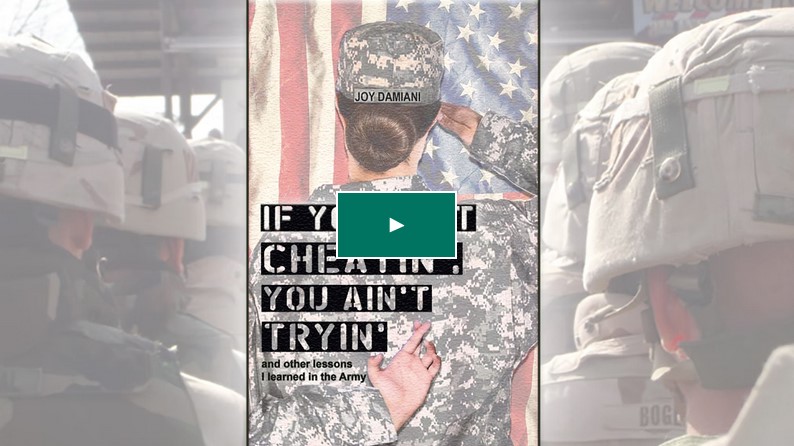By Joy Damiani
If You Ain’t Cheatin’, You Ain’t Tryin’ and Other Lessons I Learned in the Army is my answer to all of the questions everyone has asked me about the military and quite a few nobody’s asked. It’s the answer I was never able to give at cocktail parties, or backstage at shows or festivals, or while bellied up to a crowded bar. Technically, I believe it’s what’s called the “long answer.” I’ve been plugging away at it in bits and pieces for more than a decade, and now it’s ready for you to read!
Why this book?
I’ve had the chance to talk with countless high school students about the military, and every time I visit a classroom, the questions I hear are remarkably similar, and profoundly simple. They are questions that these kids will never hear a recruiter answer honestly, and they all boil down to: “What is it really like to be in the Army?”
When I first got out of the military in 2008, I went to file for unemployment in my hometown of Syracuse, NY, and was asked what I planned to do for work, now that I was done being a soldier.
“I’m going to write a book about the military!” I announced confidently to the interviewer. He was not visibly convinced, so I reassured him, “It’s going to be a bestseller!”
He gave me a look that said this day was already too long for an argument. Then he sighed, noted my answer, and approved my paperwork. I thanked him, and then set off on a road trip that led me all over the United States before bringing me back to Syracuse. After having done very little writing for several months, I went to see David Sedaris read from his newest book, When You Are Engulfed In Flames. After the reading, I waited in the two-hour line to speak to him. When it was my turn, I tripped over my words as I asked him if he had any inhibitions about writing such personal stories. Because I planned to write a book, I said, but was feeling hesitant about sharing certain details.
“I don’t think the things I write are all that personal,” he said, blowing my mind—he had just read stories about his family for two hours. How could that not be personal?
He laughed at my confusion. “I mean, I don’t write about things like sitting on the toilet or anything.” It would get easier over time, he assured me.
I said something to the effect of hoping it wouldn’t take too much time, because I really wanted to get this thing done.
“How old are you?” he asked me, packing up his table and preparing to head out into the December blizzard that had been raging all night around us.
“I’m 26,” I told him. I felt ancient already back then, war-worn from two deployments in three years, with a first failed marriage tucked securely under my belt. He just chuckled.
“Oh, you’ve got time,” he said with a smile as we put on our coats and walked out the theater doors into a wall of white flurry. “You’ve got time.”
Nearly fourteen years later, making the final edits on a book full of personal stories that are also not personal at all, it seems funny that my young self couldn’t wrap their head around this paradox, when my current self lives in it permanently. The book I’ve written comes from my experiences, but my story isn’t personal – it belongs to anyone who reads my words and feels them in their own head and heart. And it comes from not just my brain, but from anyone who’s ever asked about my military life.

